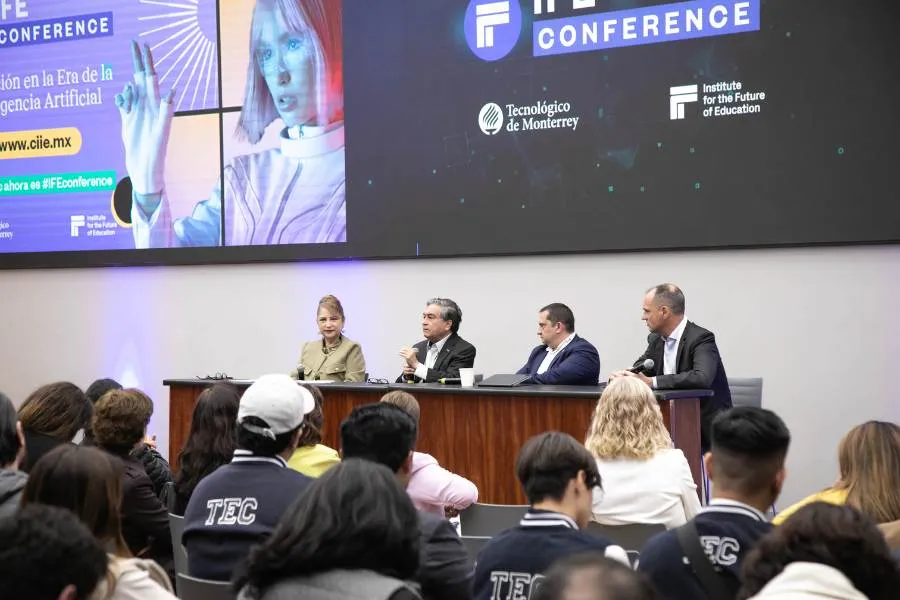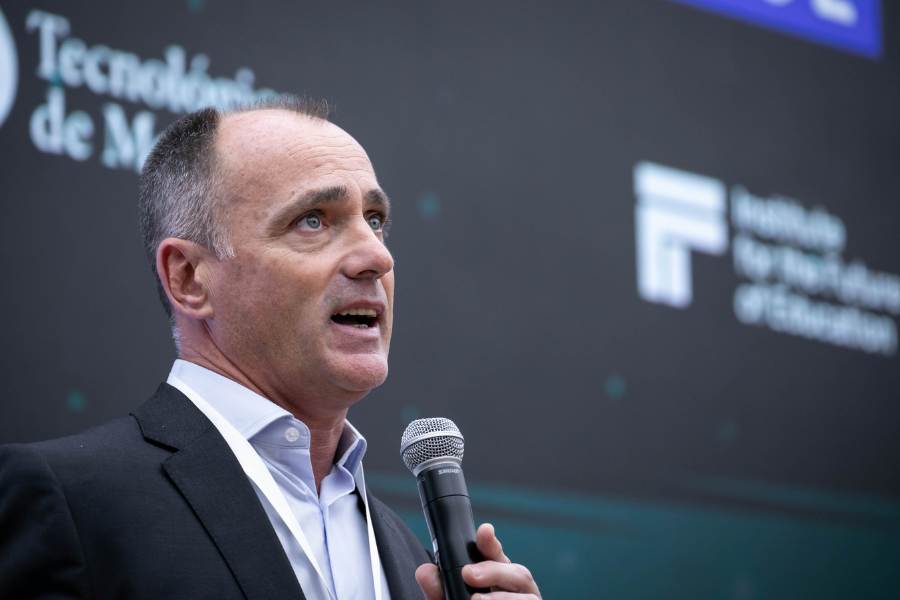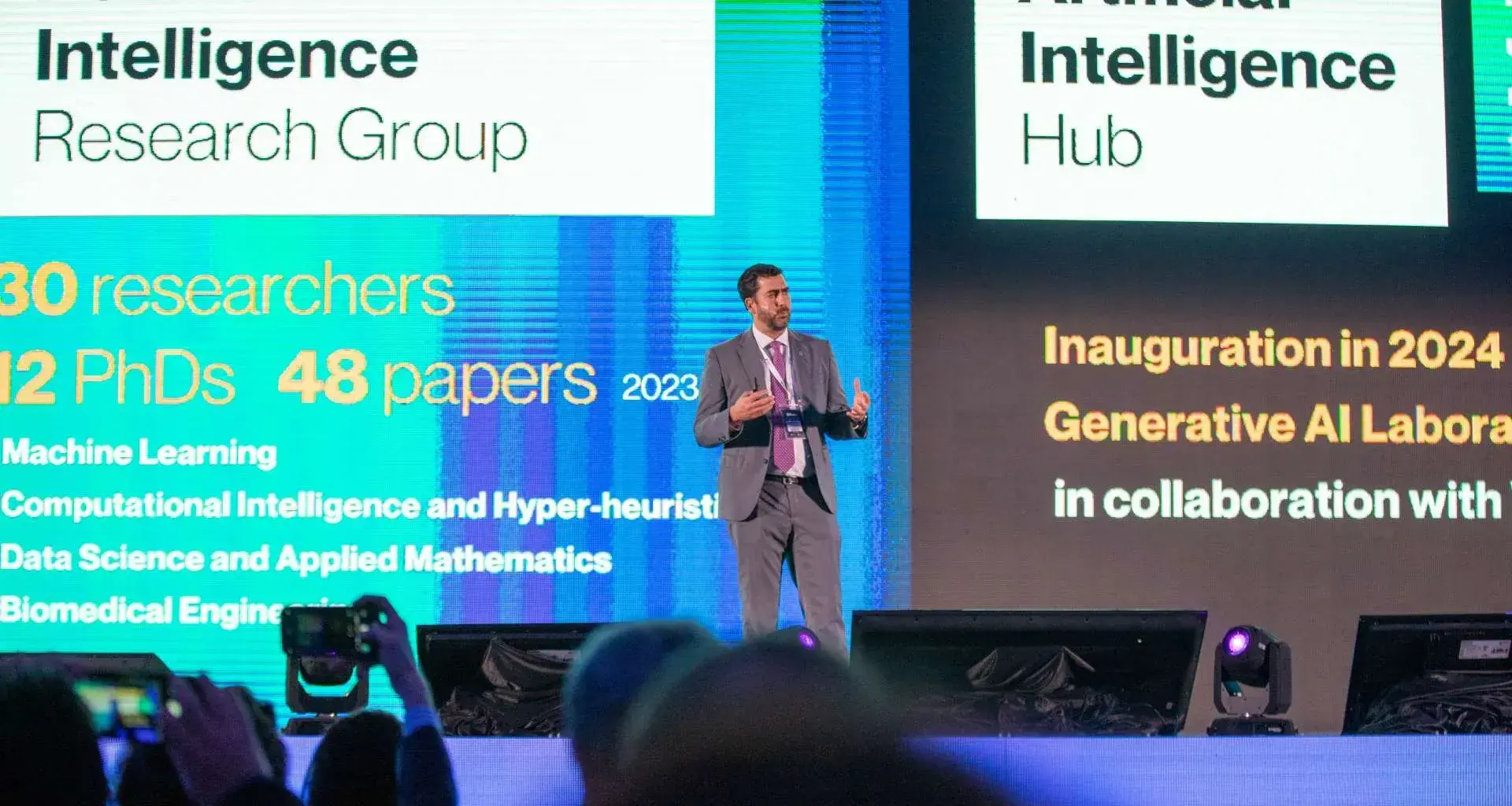What are the roles, main uses, advantages, and challenges of using Artificial Intelligence tools in education?
This was the main theme of IFE Conference 2024, the conference on educational innovation held by Tecnológico de Monterrey’s Institute for the Future of Education.
The event, held at the Tec’s Monterrey campus between January 23 and 25, was attended by specialists, professors, and researchers from around the world who addressed this and other topics.
CONECTA presents some of the uses and opinions that several speakers shared about Artificial Intelligence (AI) and its impact on educational work.

1. Three areas for Artificial Intelligence in Education
Dr. Rose Luckin, a professor at the UCL Knowledge Lab in London, shared three key points about Artificial Intelligence that education professionals can focus on.
“We can analyze this new vision in three ways: firstly, by focusing on AI tools for educational challenges; secondly, by acknowledging the value of our human intelligence; and lastly, by assessing what we learn from AI.”
To summarize these three:
Artificial Intelligence in education:
- Artificial Intelligence tools
- Maximizing Human Intelligence
- Artificial Intelligence education
The first involves the use of tools that allow educators to reduce their time when performing repetitive tasks.
The second focuses on the intention to use tools to boost the learner’s intelligence, not replace it with artificial intelligence.
And the third educates students about artificial intelligence itself so they learn how to use it effectively, safely, and ethically.
“From customized learning pathways to intelligent tutoring, AI is offering customized solutions and fostering a more accessible environment.” - Rose Luckin
2. Artificial intelligence to make us smarter, not dumber
According to Rose Luckin, it is important to be wary of becoming “diluted” by artificial intelligence.
“We need to value the elements of human intelligence that are not present in Artificial Intelligence.”
She pointed out that interdisciplinary and social intelligence, metacognitive and meta-contextual areas, and the perception of self-efficacy are still distinctive human elements.
“In contrast to non-biological cognition, human cognition is always evolving, as our memory, navigational skills, and more can be accelerated and magnified by external stimuli,” she said.
3. AI tools for customized learning
“Neither artificial intelligence nor education is new; what is new is free and open access to AI tools,” Rose Luckin said.
She added that AI tools can identify “micro-achievements” in the learner’s path, serving as virtual assistants to develop more precise plans for each individual.
She also said that these tools are particularly useful when it comes to pattern recognition based on the behavior of different profiles.

4. Artificial intelligence as an educational assistant
Large language models (such as ChatGPT) are a type of generative AI that is already popular, which can be useful time-savers for professors, said Ryan Baker of the University of Pennsylvania.
“Using these models essentially provides learning support with teaching assistants able to answer questions and interact with students,” he said.
“These new AI assistants save professors’ time and can provide faster responses to students,” he added.
Baker said that using “accolades” in generative AI models improves results, suggesting the use of words such as “expert,” “famous,” “award-winning,” and so on.
“When we search for someone and add the word ‘expert’, we get closer matches related to other associated experts in the field we are interested in,” he explained.
5. Encouraging interaction with bots and automated chats that respond to questions about the class
Based on his experience as a rector, José Mayorga explained that teachers can now create their own bots with information from their classes.
In this way, the Rector of the Bolivian Private University said that the students are encouraged to interact in a more immersive way with the course materials.
“There are many sites and apps that help you develop your own ChatGPT and all you have to do is feed the bot with the material from your syllabus,” he explained.
“This is part of the trend of hyper-individualization of information and is something that educators not only can do but should start doing,” he said.

6. Desirable role of multidisciplinary educators
Academics Jordi Torras, Francisco García-Peñalvo, and José Mayorga agree that a major step in AI training for educators requires them to be familiar with non-natural languages regardless of their field.
“We need to overcome disciplinary barriers and create more multidisciplinary educators, not experts in programming but knowledgeable in basic AI terms,” said García-Peñalvo.
“Professors, as well as students, have to keep themselves informed to avoid sticking to outdated practices,” Mayorga said.
They added that it is easier with the use of apps that help with guided and assisted programming.
7. Educators exploring AI, the key to digital inclusion
Lastly, digital transformation inevitably requires the integration of AI into the classroom, and Dr. Francisco García-Peñalvo believes that learning how to use it is key.
According to the University of Valladolid professor, this will encourage more frequent use and reduce the digital divide.
“The biggest obstacle to digital transformation in education is educators who refuse to let their students use AI, as well as students who misuse it.
“However, balancing the integration of AI with its ethical use is a good practice that will result in a less exclusionary environment,” he said.
García-Peñalvo gave the presentation Generative Artificial Intelligence in Higher Education: A 360° Perspective at IFE Conference 2024.
“The biggest obstacle to digital transformation in education is educators who refuse to let their students use AI.”
Improved productivity, assessment support, customized learning plans, and boosting creativity are the main advantages of AI, he added.
Certainly, it is necessary to implement “good practices” such as data protection and the enforcement of ethical guidelines, he said.
“Back in the day, professors were against the use of calculators in class. This is happening with AI, we just need to adapt,” added Jordi Torras from the University of Barcelona during the discussion.
YOU MAY ALSO BE INTERESTED IN:





